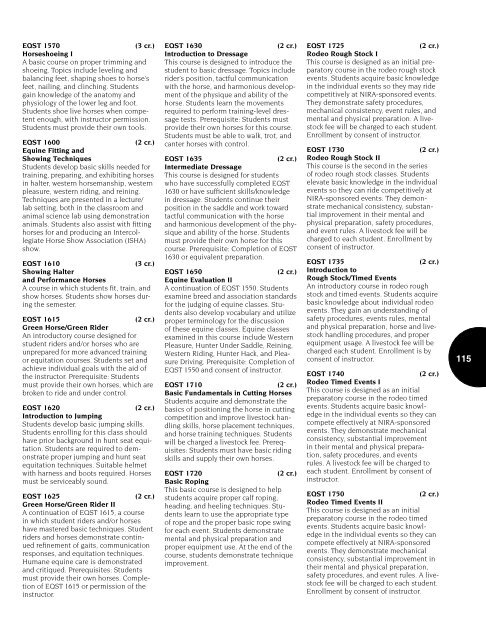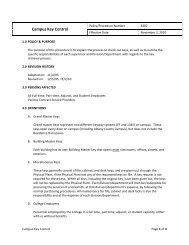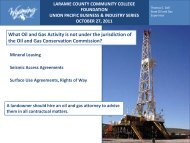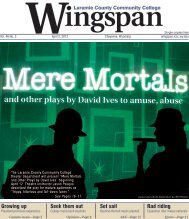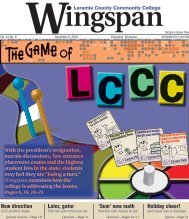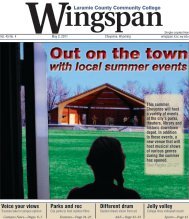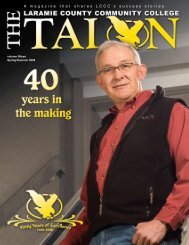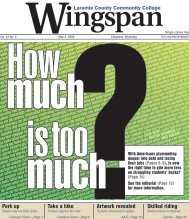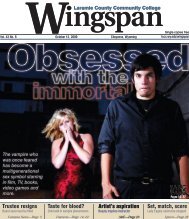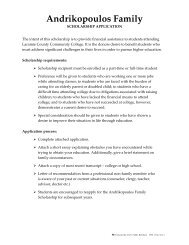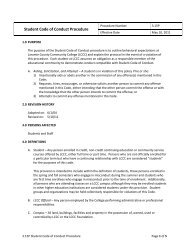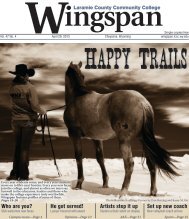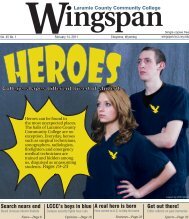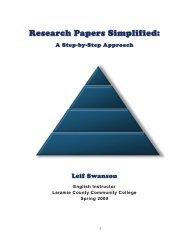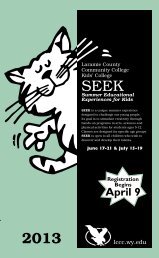LCCC policy - Laramie County Community College
LCCC policy - Laramie County Community College
LCCC policy - Laramie County Community College
You also want an ePaper? Increase the reach of your titles
YUMPU automatically turns print PDFs into web optimized ePapers that Google loves.
EqST 1570<br />
(3 cr.)<br />
Horseshoeing I<br />
A basic course on proper trimming and<br />
shoeing. Topics include leveling and<br />
balancing feet, shaping shoes to horse’s<br />
feet, nailing, and clinching. Students<br />
gain knowledge of the anatomy and<br />
physiology of the lower leg and foot.<br />
Students shoe live horses when competent<br />
enough, with instructor permission.<br />
Students must provide their own tools.<br />
EqST 1600<br />
(2 cr.)<br />
Equine Fitting and<br />
Showing Techniques<br />
Students develop basic skills needed for<br />
training, preparing, and exhibiting horses<br />
in halter, western horsemanship, western<br />
pleasure, western riding, and reining.<br />
Techniques are presented in a lecture/<br />
lab setting, both in the classroom and<br />
animal science lab using demonstration<br />
animals. Students also assist with fitting<br />
horses for and producing an Intercollegiate<br />
Horse Show Association (ISHA)<br />
show.<br />
EqST 1610<br />
(3 cr.)<br />
Showing Halter<br />
and Performance Horses<br />
A course in which students fit, train, and<br />
show horses. Students show horses during<br />
the semester.<br />
EqST 1615<br />
(2 cr.)<br />
Green Horse/Green Rider<br />
An introductory course designed for<br />
student riders and/or horses who are<br />
unprepared for more advanced training<br />
or equitation courses. Students set and<br />
achieve individual goals with the aid of<br />
the instructor. Prerequisite: Students<br />
must provide their own horses, which are<br />
broken to ride and under control.<br />
EqST 1620<br />
(2 cr.)<br />
Introduction to jumping<br />
Students develop basic jumping skills.<br />
Students enrolling for this class should<br />
have prior background in hunt seat equitation.<br />
Students are required to demonstrate<br />
proper jumping and hunt seat<br />
equitation techniques. Suitable helmet<br />
with harness and boots required. Horses<br />
must be serviceably sound.<br />
EqST 1625<br />
(2 cr.)<br />
Green Horse/Green Rider II<br />
A continuation of EQST 1615, a course<br />
in which student riders and/or horses<br />
have mastered basic techniques. Student<br />
riders and horses demonstrate continued<br />
refinement of gaits, communication<br />
responses, and equitation techniques.<br />
Humane equine care is demonstrated<br />
and critiqued. Prerequisites: Students<br />
must provide their own horses. Completion<br />
of EQST 1615 or permission of the<br />
instructor.<br />
EqST 1630<br />
(2 cr.)<br />
Introduction to Dressage<br />
This course is designed to introduce the<br />
student to basic dressage. Topics include<br />
rider’s position, tactful communication<br />
with the horse, and harmonious development<br />
of the physique and ability of the<br />
horse. Students learn the movements<br />
required to perform training-level dressage<br />
tests. Prerequisite: Students must<br />
provide their own horses for this course.<br />
Students must be able to walk, trot, and<br />
canter horses with control.<br />
EqST 1635<br />
(2 cr.)<br />
Intermediate Dressage<br />
This course is designed for students<br />
who have successfully completed EQST<br />
1630 or have sufficient skills/knowledge<br />
in dressage. Students continue their<br />
position in the saddle and work toward<br />
tactful communication with the horse<br />
and harmonious development of the physique<br />
and ability of the horse. Students<br />
must provide their own horse for this<br />
course. Prerequisite: Completion of EQST<br />
1630 or equivalent preparation.<br />
EqST 1650<br />
(2 cr.)<br />
Equine Evaluation II<br />
A continuation of EQST 1550. Students<br />
examine breed and association standards<br />
for the judging of equine classes. Students<br />
also develop vocabulary and utilize<br />
proper terminology for the discussion<br />
of these equine classes. Equine classes<br />
examined in this course include Western<br />
Pleasure, Hunter Under Saddle, Reining,<br />
Western Riding, Hunter Hack, and Pleasure<br />
Driving. Prerequisite: Completion of<br />
EQST 1550 and consent of instructor.<br />
EqST 1710<br />
(2 cr.)<br />
Basic Fundamentals in Cutting Horses<br />
Students acquire and demonstrate the<br />
basics of positioning the horse in cutting<br />
competition and improve livestock handling<br />
skills, horse placement techniques,<br />
and horse training techniques. Students<br />
will be charged a livestock fee. Prerequisites:<br />
Students must have basic riding<br />
skills and supply their own horses.<br />
EqST 1720<br />
(2 cr.)<br />
Basic Roping<br />
This basic course is designed to help<br />
students acquire proper calf roping,<br />
heading, and heeling techniques. Students<br />
learn to use the appropriate type<br />
of rope and the proper basic rope swing<br />
for each event. Students demonstrate<br />
mental and physical preparation and<br />
proper equipment use. At the end of the<br />
course, students demonstrate technique<br />
improvement.<br />
EqST 1725<br />
(2 cr.)<br />
Rodeo Rough Stock I<br />
This course is designed as an initial preparatory<br />
course in the rodeo rough stock<br />
events. Students acquire basic knowledge<br />
in the individual events so they may ride<br />
competitively at NIRA-sponsored events.<br />
They demonstrate safety procedures,<br />
mechanical consistency, event rules, and<br />
mental and physical preparation. A livestock<br />
fee will be charged to each student.<br />
Enrollment by consent of instructor.<br />
EqST 1730<br />
(2 cr.)<br />
Rodeo Rough Stock II<br />
This course is the second in the series<br />
of rodeo rough stock classes. Students<br />
elevate basic knowledge in the individual<br />
events so they can ride competitively at<br />
NIRA-sponsored events. They demonstrate<br />
mechanical consistency, substantial<br />
improvement in their mental and<br />
physical preparation, safety procedures,<br />
and event rules. A livestock fee will be<br />
charged to each student. Enrollment by<br />
consent of instructor.<br />
EqST 1735<br />
(2 cr.)<br />
Introduction to<br />
Rough Stock/Timed Events<br />
An introductory course in rodeo rough<br />
stock and timed events. Students acquire<br />
basic knowledge about individual rodeo<br />
events. They gain an understanding of<br />
safety procedures, events rules, mental<br />
and physical preparation, horse and livestock<br />
handling procedures, and proper<br />
equipment usage. A livestock fee will be<br />
charged each student. Enrollment is by<br />
consent of instructor.<br />
EqST 1740<br />
(2 cr.)<br />
Rodeo Timed Events I<br />
This course is designed as an initial<br />
preparatory course in the rodeo timed<br />
events. Students acquire basic knowledge<br />
in the individual events so they can<br />
compete effectively at NIRA-sponsored<br />
events. They demonstrate mechanical<br />
consistency, substantial improvement<br />
in their mental and physical preparation,<br />
safety procedures, and events<br />
rules. A livestock fee will be charged to<br />
each student. Enrollment by consent of<br />
instructor.<br />
EqST 1750<br />
(2 cr.)<br />
Rodeo Timed Events II<br />
This course is designed as an initial<br />
preparatory course in the rodeo timed<br />
events. Students acquire basic knowledge<br />
in the individual events so they can<br />
compete effectively at NIRA-sponsored<br />
events. They demonstrate mechanical<br />
consistency, substantial improvement in<br />
their mental and physical preparation,<br />
safety procedures, and event rules. A livestock<br />
fee will be charged to each student.<br />
Enrollment by consent of instructor.<br />
115


